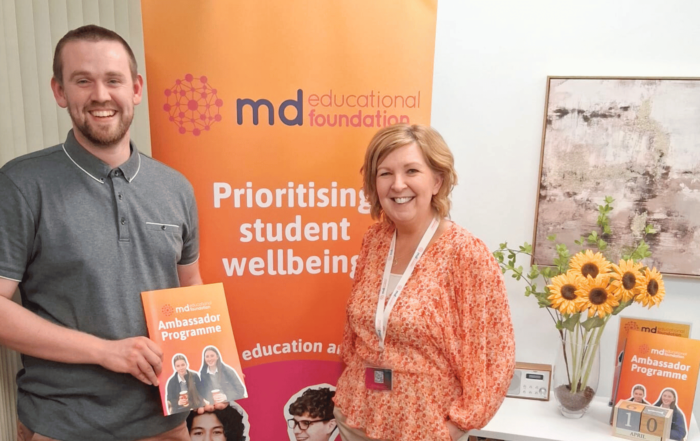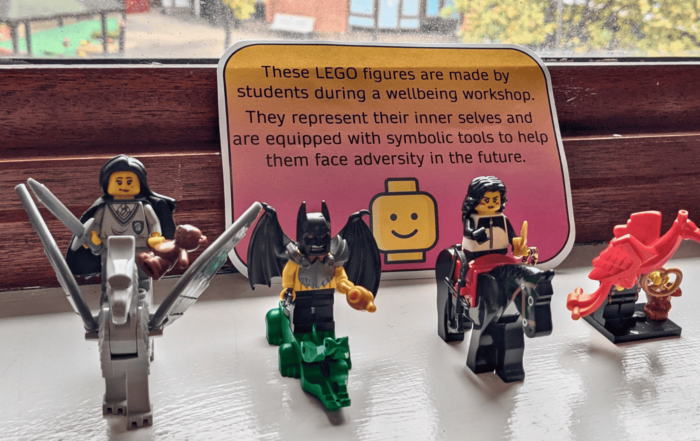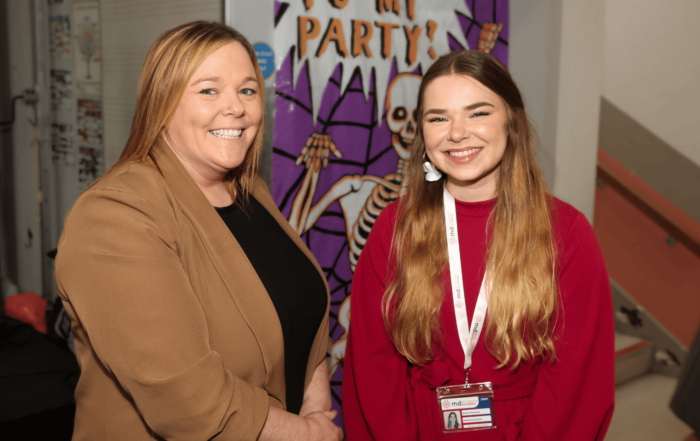According to the report “Let’s talk about death: All children in England should receive grief education at school” (2023) published by the University of Bristol, nearly all British children experience some kind of bereavement by the age of sixteen. Childhood Bereavement Network estimates that around 26,900 parents die each year in the UK, leaving behind dependent children and young people. Many more have been bereaved of grandparents, friends, relatives or pets. As found in the research, children and young people want to learn about grief and receive support to help them meaningfully deal with loss and death.
The University of Bristol’s policy report encourages that all children should receive grief education and that learning about loss and death should form part of the government’s commitment to teach mental wellbeing at school. The report also highlights that “unresolved grief can have a significant and lasting impact on a child’s wellbeing and has been associated with depression, anxiety and other psychological issues, as well as lower academic outcomes, substance misuse, unemployment, criminal convictions and suicide. It is essential that we equip young people with the knowledge and strategies to cope with grief and support others.”
Below we talk with Catherine Llewellyn, Clinical Supervisor for mdeducational foundation, about the impact of grief on young people and how we can support them in dealing with death and loss.
What is grief and how does it show up in young people?
Catherine supports several of the schools our charity provides funding for, and she also works closely with the Wellbeing Leads that have been placed in each educational setting. She explains what grief is from her perspective:
“Grief is defined as the primarily emotional process of reacting to the loss of a loved one through death. Symptoms of grief can include psychological or physiological distress, separation anxiety, confusion, yearning, recalling memories often for fear of forgetting them, and apprehension about the future. Grieving doesn’t have to be around the loss of a person it can also be around the loss of a pet, a relationship or even the loss of a hope or dream.

YoungMinds puts into words what grief can feel like for those who experience it…
‘Some people find it overwhelming. Others experience it as a physical pain. Some people find that they just feel numb.
There’s no right way to feel when you experience a loss. Your reaction is valid, whatever it looks like. And if you don’t feel much at all, that’s fine too. It doesn’t mean you’re made of stone, or that you didn’t care about the person you lost.
It’s also common for your feelings to change with time. Try to feel your feelings without judging yourself. Grief is hard, so try to go easy on yourself.’
Basically, there are no rules for how long grief lasts or what it feels like. Each young person’s grieving process will be individual to them and the circumstances surrounding their bereavement. There’s also no right or wrong way to manage grief. Seeking specialised support can be helpful and thankfully there’s lots of it available, especially for young people.”
How can grief affect a young person’s daily life, wellbeing, relationships, and academic performance?
From Catherine’s point of view “young people are at a stage in their development when they are trying to establish their own identity. This can mean family relationships and beliefs are challenged, and a significant bereavement at this time can cause a major shift in a person’s original worldview.
Grief can also impact friendships, even the most supportive ones. Often the young person who is grieving feels isolated and different from their friendship group, who may not have had any similar experiences.
There can also be a sense of not wanting to feel like a burden and the impression that others are thinking things like ‘you should be over this by now’. Loss and grief can have a huge impact on a young person’s wellbeing and seeking support can be difficult.
Managing pressure such as exam stress whilst experiencing grief can be particularly difficult. It’s therefore essential for a young person that’s grieving during exam season to take good care of their physical and emotional wellbeing where possible. Getting enough sleep, eating nutritious meals, and engaging in activities that bring comfort are a must! As is making time to remember that special person.”
What are some effective strategies for supporting young people who are grieving?
As the research findings point out, grief education would help to normalise the feeling of grief. Those who participate in grief education have been found to be more capable of discussing it and less anxious about loss and death. Additionally, the report highlights that, a change in the current curriculum could help with grief support in schools, if the right staff training was in place for teachers.
Catherine also shares below some practical strategies for supporting a young person who is grieving:
“Possibly the most important strategy in terms of supporting young people through their grief process is to listen and offer whatever is needed at that particular time. This could be space, an opportunity to talk through difficulties or share memories, listening and hearing their perspective, acknowledging there’s no right or wrong way to grieve, respecting their choices, accepting their feelings, and refraining from making assumptions, as everyone’s grief journey is different. It’s also important to be mindful of cultural or religious differences when it comes to grieving.
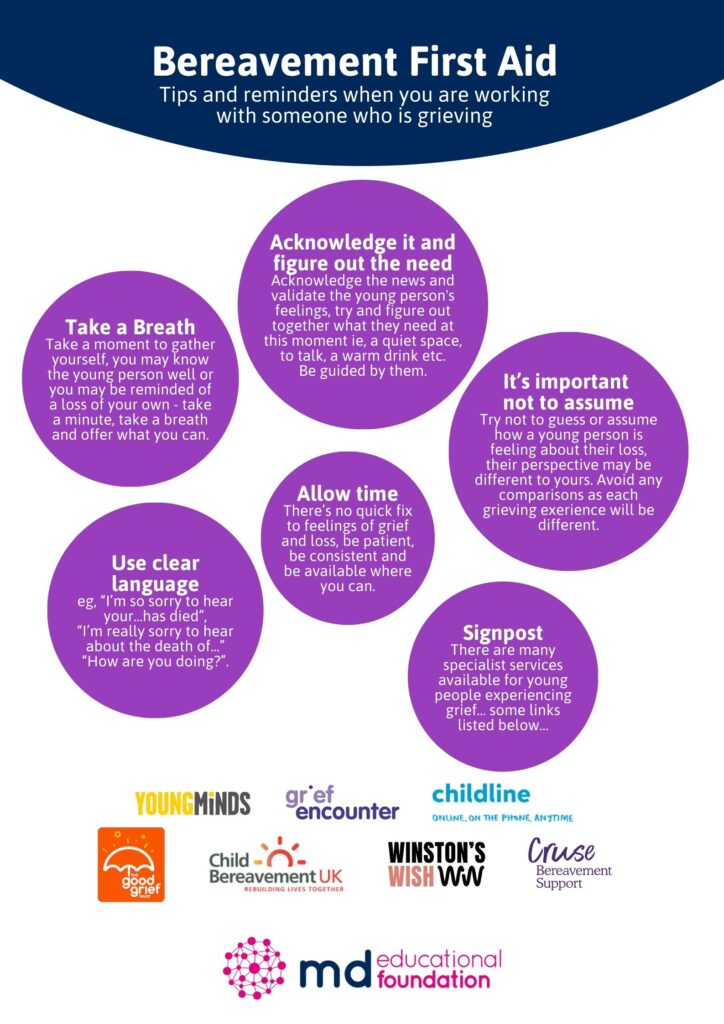
One helpful strategy to support a young person in understanding their grief and acknowledging we all grieve differently may be to be aware of the seven stages of grief. These are not linear stages to work through, but rather puzzle pieces that fit together at various times, maybe going back and forth too.
It could be that a young person is struggling to express how they are feeling and the suggestion of some creative therapy such as drawing or doodling might be useful. Maybe making a memory jar or creating a top ten memories list (see more about these activities below) could help.”
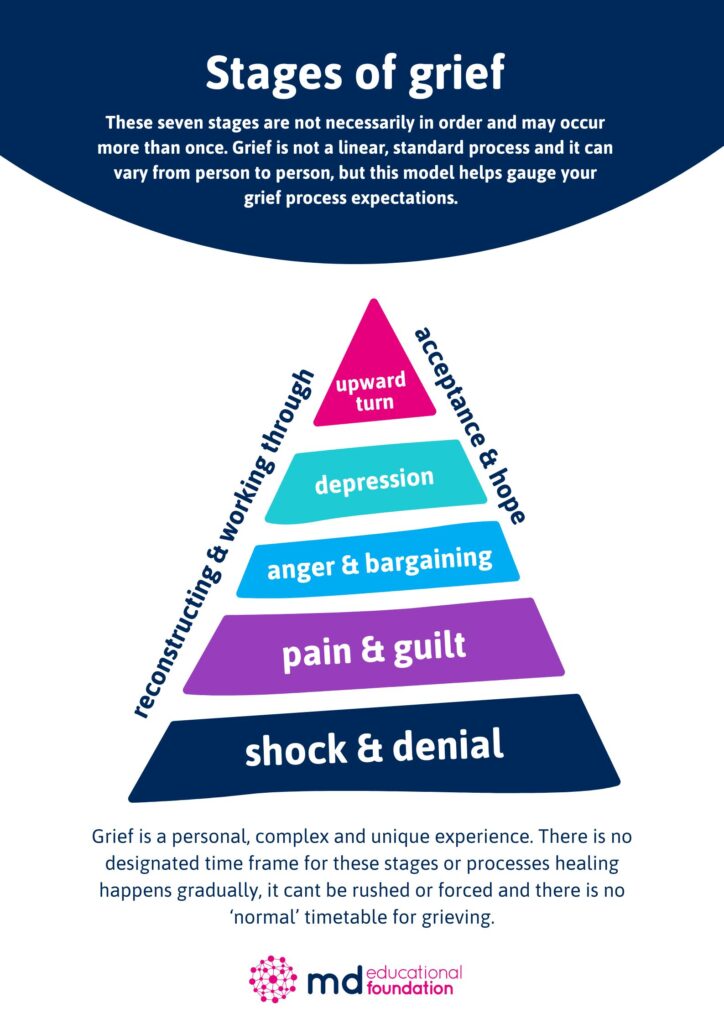
How can you create a supportive environment within school to help young people feel comfortable in seeking support for their grief?
Young people spend a lot of their time in school, and it can be very difficult after losing a loved one, to return to school and focus on the everyday. Having a dedicated wellbeing professional within the school opens a door for a grieving young person to have a place to go and share their experience, or simply to take a moment to go through their feelings. A Wellbeing Lead can support a young person with grief, but also with taking steps forward in their life after a loss. They can also be there to support the school community as a whole if there has been a loss of a student, teacher or another member.
At mdeducational foundation, we’re enabling educational settings to kickstart their long-term wellbeing strategy, by providing salary-funded Wellbeing Lead placements in post-16 educational settings. Almost all of our Wellbeing Leads based across the UK and Ireland have worked with young people and school communities after a loss. Catherine describes the benefit of having a dedicated Wellbeing Lead in a school when a young person is experiencing grief:
“Ideally, the Wellbeing Lead will already be known to the young person experiencing grief as they will have already accessed the Wellbeing Hub in some way. Our Wellbeing Leads will reach out to a young person and offer some space to talk or share their experience and ask them what support they may need. In these situations, the Wellbeing Lead will give the young person the chance to take the lead.
Returning to school or college after a bereavement can be challenging, so it’s important to discuss the return with the young person and ask what the school or college can do to make it as smooth as can be, for example:
- Find out whether the young person would like their classmates to be informed
- Create a comfortable environment
- Be aware of cultural or religious customs around death and bereavement that may impact the young person
- Don’t make assumptions about how the young person may or may not be feeling (for example, they might not have had a ‘good relationship’ with the person who has died)
- Communicate clearly using the appropriate language, such as terms like death and died rather than euphemisms like ‘gone to heaven’
Additionally, be mindful of anniversaries or special days that may be more difficult for the young person who is grieving and recognise that various times in the academic year such as exam season may feel more stressful too, so you can better attend to their needs. Wellbeing Leads can advocate for young people, particularly when they are finding things more difficult.
I want to share a story of a bereaved young person who received help and support from one of our dedicated Wellbeing Leads. This student met with them in their school after experiencing the sudden death of a close relative. The Wellbeing Lead was able to apply for special consideration around results from the student’s first university choice, due to the loss of their family member. This is just a small step that can be taken to remove some of the pressure and distress for that young person at an already difficult time. The student was able to attend exams knowing that if they struggled on the day, the potential negative impact on their future would be reduced.
The Wellbeing Hub allows for space and quiet times of reflection as well as being a place to seek practical support. The impact of this on a young person can be huge, just to know there is someone and somewhere they can go to for support whenever they need it.”
In a previous blog, we shared a case study from a grateful parent, who told her story about witnessing her own daughter’s journey of strength in the face of adversity, thanks to the support from her school’s Wellbeing Lead. This enables us to shed light on how critical student wellbeing support really is, and the positive impact it can have on their educational journey. Sometimes all we need is to have someone to talk to and a safe place to go – where we are welcomed with open arms, made to feel accepted and provided with guidance, support and understanding. Read the full case study here.
How do mdeducational foundation’s Wellbeing Leads support students dealing with grief?
The role of an mdeducational foundation Wellbeing Lead is to promote positive wellbeing through the delivery of a wellbeing curriculum, by normalising student psychological fitness and resilience. They create safe spaces for post-16 students within schools and educational settings across the UK and Ireland. Having access to a safe space, a Wellbeing Hub, and a listening ear from a wellbeing professional can be vital for a young person who is going through grief and loss. Having a dedicated Wellbeing Lead based in your school can offer them an accessible way to share their feelings and receive support and resources to help them through grief and prepare them for the next step forward in their lives.
Catherine also shared that, “according to Julia Samuel MBE (founder of Grief Works & psychotherapist), 15% of psychological disorders come from unresolved grief, demonstrating the importance of the role of a Wellbeing Lead within an educational setting being available to guide and support any grieving young person when needed.”
One of our Wellbeing Leads based in Ireland, Grace McGee, shared her thoughts on how to include the whole school and work collectively if there has been a loss within the school community:
“Every young person will grieve in their own way. It’s important that students are supported in their grief; to feel listened to and to validate their loss. We can support ourselves and each other in different ways. For example, we could create a memory tree in our school community, where students are invited to remember those who are no longer with us. Every student would have the opportunity to design a leaf or an angel and write the names of loved ones who have passed away on it.”

Workshop and activity ideas for addressing and helping with grief in young people
Catherine shared that “perhaps a more general workshop around loss and grief can help to support young people by giving them a safe space to share their experiences, including things they’ve found useful in helping to cope with their emotions. They can provide an opportunity to talk about feelings that might arise during the grieving process and share their feelings in a supportive space that’s carefully managed by the Wellbeing Leads.
Within 1-to-1 work or sometimes in a group, the memory jar activity detailed below can be very therapeutic. Other ideas include workshops on ‘Growing around grief’, ‘Tips for expressing grief’ and ‘How to support a friend who is grieving’.”
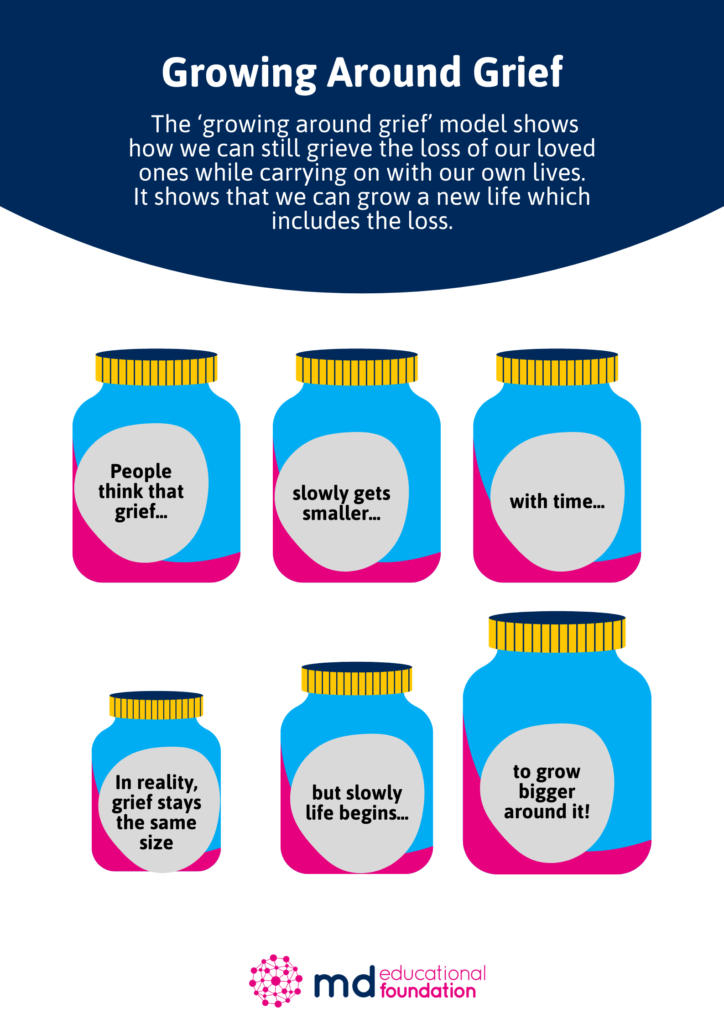
Memory Jar activity
The Memory Jar activity creates a way for a young person to express their memories of those they have lost, in a visual way; a way to remember a special person and an opportunity to communicate their feelings.
Below are some instructions for creating a jar layered with different colours that trigger different memories. You can also choose to add objects to the jar that have significant meaning.
- Gather a glass jar with a lid, a pen, table salt, coloured chalks or pastels, felt tip pens and six paper plates
- Carefully fill the jar with salt then place it to one side
- On a piece of paper, write down six key memories you have about the person who has died
- Draw a dot of colour next to each memory (for example, blue for their favourite song, yellow for the holiday memory…etc)
- Spread out six paper plates and split the salt from the jar between them
- Rub a different piece of chalk or pastel into each pile of salt to create 6 different coloured piles that match the colour of your chosen dots.
- Carefully pour each pile of salt into the jar one at a time to create layers
- Gently tap the jar to settle the salt, then fill up any remaining space with plain salt to prevent the layers from mixing
- Put your jar in a place where you can easily see it, and keep your memory sheet somewhere safe as a keepsake
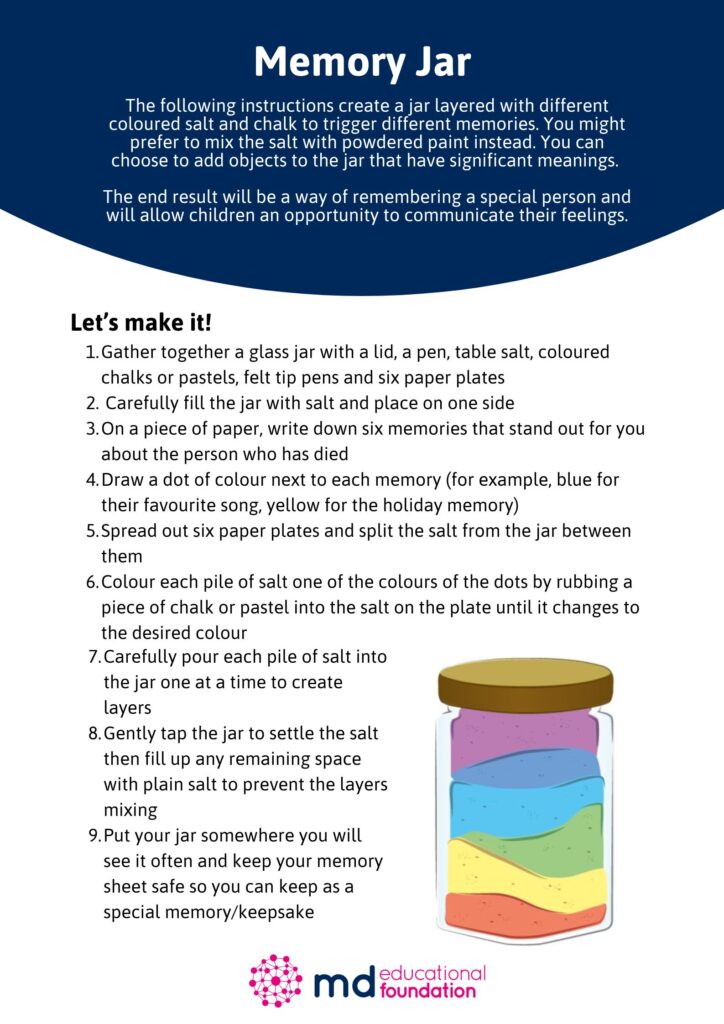
Top 10 Captured Moments activity
During a time of grief, embracing the good times spent with the person who has died can be comforting and help young people to cope with their feelings. Sometimes working around the pain and turning it into something creative can help to channel the feelings and make it easier to process thoughts.
In this activity, you can use the space in the blank photographs to add special moments with the person who has passed away. You can choose the style you want to fill in the blanks, or do a mixture of styles.
Here are some examples of how to fill in the blank spaces:
- Use an actual photo you have of the memory
- Draw in the special situation
- Note down the memory in writing
- Create a collage from cut-out magazine pictures and words to describe the moment visually
The end result can work as a way to remember the person on big occasions like on their birthday. Celebrate the special moments you had with them and focus on sharing your favourite memories.
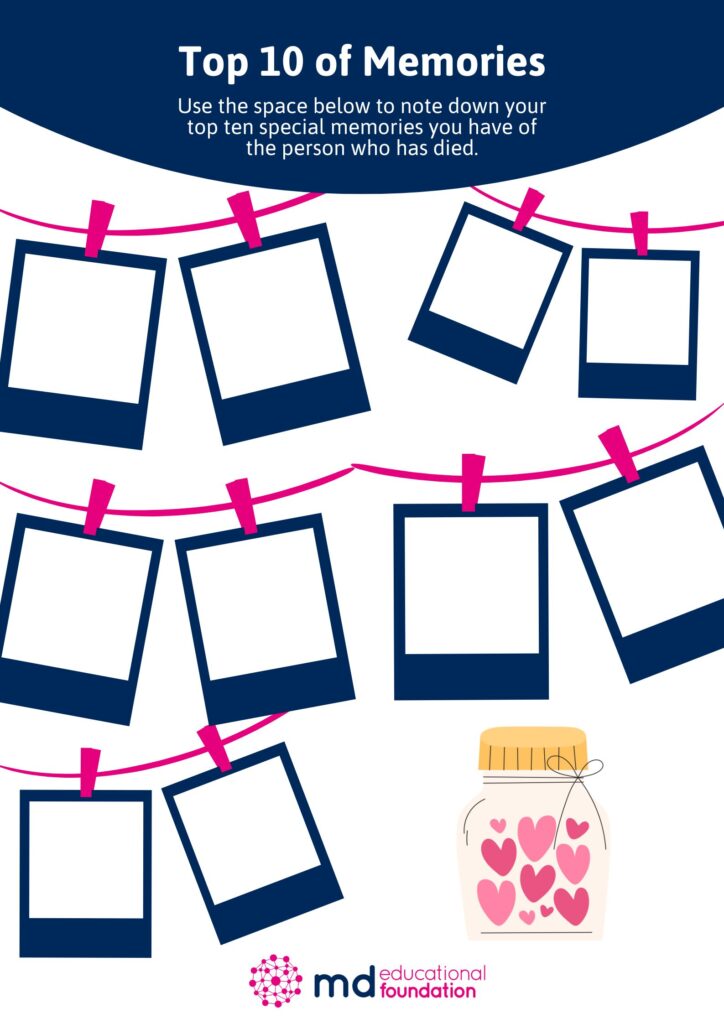
Jar of Memories activity
Activities like the Jar of Memories can help a student to remember positive memories of the person they have lost. Sometimes when we process grief, it can feel like moving forward means forgetting the person, but that’s not the case. Feeling less sadness doesn’t mean you don’t care for the person you no longer have in your life, it’s part of working through your grief.
Expressing the memories and moments you shared with the person you lost can help with grief and keeping their memory alive. This activity can be done together with the people around you who are also grieving – sharing and celebrating the special memories of the person you have all lost. Sharing the way you are feeling with the people around you can help everyone cope better.
On this memory jar, write down a list of special moments and memories of the person who has passed away. The end results is something you can hold as a keepsake and a collage of fond memories.
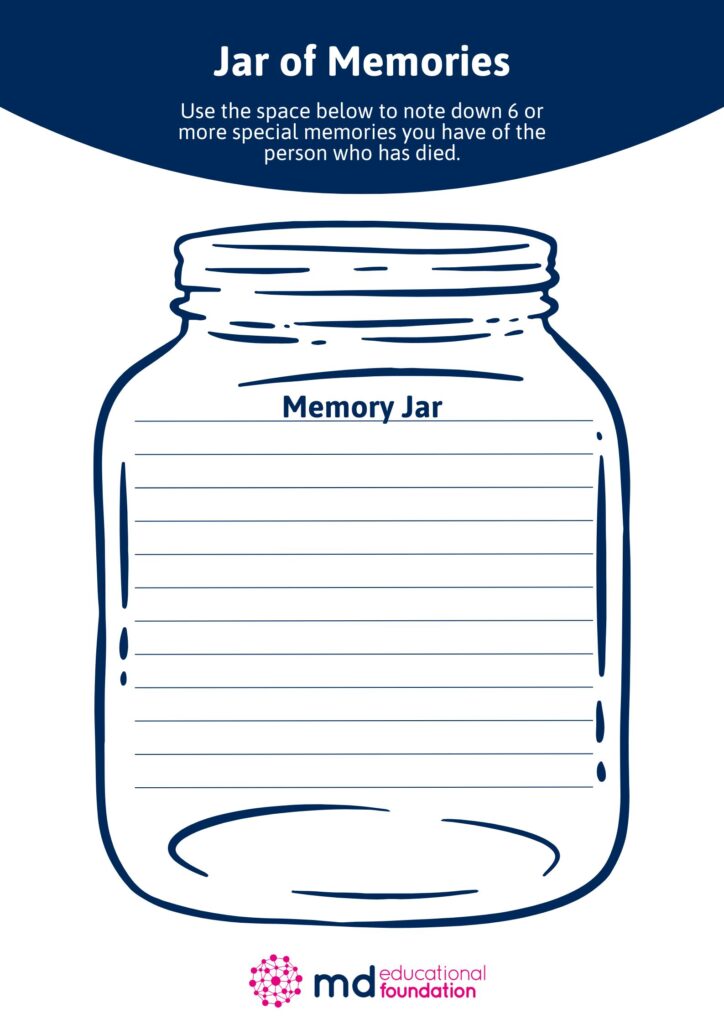
Additional resources for support with processing grief
mdeducational foundation Partnerships and Collaborates with a number of organisations that share our common goal to support more post-16 students with their wellbeing. One of these organisations is Childline, a free, private and confidential service for anyone under 19 in the UK – they can talk to Childline about any issue they’re going through.
Childline is free, confidential and available any time, day or night. You can talk to Childline:
- by calling 0800 1111
- by email
- through 1-2-1 counsellor chat
You can also learn more on Childline’s website.
Our collaboration with Childline provides mdeducational foundation with high-quality resources that help our Wellbeing Leads to support young people’s wellbeing – these resources can be meetings, resource papers or different sessions with the Wellbeing Leads. Childline also offers more specific support around topics such as ‘when an online friend dies’ or ‘losing someone to suicide’, both topics often particularly relevant to the young people our Wellbeing Leads are working with. Here’s a page from Childline on the topic of grief and loss: https://www.childline.org.uk/info-advice/your-feelings/feelings-emotions/when-someone-dies/
Below are some useful websites to get help with grief:
Prioritising student wellbeing through education and beyond
mdeducational foundation is a charity that provides a three-year salary-funded commitment to placing dedicated wellbeing professionals within educational settings, enabling them to kickstart their long-term wellbeing strategies.
Related posts
Championing student wellbeing: Meet James Sweeney, the first mdeducational foundation Ambassador
At mdeducational foundation, we’re committed to prioritising student wellbeing - and now, we’re continuing that mission by inviting members of our community to join us in championing a brighter future for young people. We’re [...]
6 mental health workshops to support and improve the wellbeing of young people in schools
Wellbeing workshops are a great way to promote positive wellbeing, encourage young people to look after their mental health and remove the stigma around mental health and wellbeing. In schools, workshops can provide many [...]
Shining the spotlight on student wellbeing: Meet Susanna Neuvonen, Marketing Executive at mdeducational foundation
At mdeducational foundation, we’re dedicated to prioritising student wellbeing by providing fully funded support in schools and educational settings across the UK and Ireland. Our mission is to ensure that all post-16 students feel supported [...]


